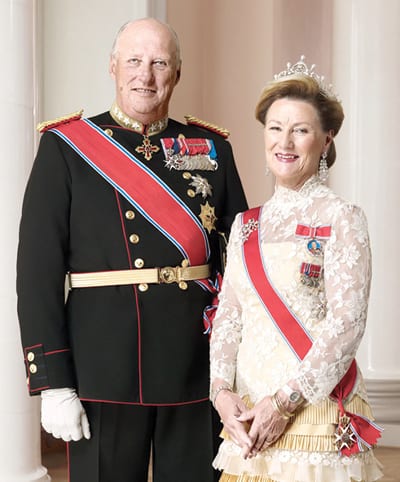The unification of Norway was achieved in 872AD, the year the Kingdom of Norway was founded, with Harald Fairhair as its first king. From 1319 to 1905, the Kingdom of Norway existed as a union with Denmark, Sweden, or both. The modern Kingdom of Norway has only existed as an independent entity since the dissolution of the personal union with Sweden on 18th November 1905.
Today, Norway is a constitutional monarchy. King Harald V has no real political power, and the parliament, Stortinget, is the country’s highest authority. Norway has been a member of NATO since 1949. Voters have twice rejected membership in the European Union, but Norway is a party to a European Free Trade Association agreement.
Prime Minister Erna Solberg of the Conservative Party was elected in September 2013 and leads a centre-right coalition minority government. Norway is one of the world’s most prosperous countries. Fisheries, metal, and oil are the most important commodities. Norway saves a large portion of its petroleum-sector revenues, including dividends from the partially state-owned Statoil and taxes from oil and gas companies operating in Norway, in its Government Pension Fund–Global, valued at $900 billion.

The Norwegian economy’s strong competitiveness is built on openness and transparency with policies that support dynamic trade and investment. The quality of the legal and regulatory framework is among the world’s highest, institutionalizing the effective rule of law. The planned tax reform bill focuses on lowering the corporate income tax rate from 27 per cent to 22 per cent by 2018.
It has a mixed economy with the government owning about 32% of the listed shares on the Oslo stock exchange, and holding shares in around 10–15% of Norwegian industry (as of 2005). State ownership is most dominant in the oil, hydroelectric, and mining sectors. At considerable expense, the government provides subsidies for industry, agriculture, and outlying regions. About half of the total goes to agriculture.
The largest revenue sources for Norway are the extraction and export of oil and natural gas from the ocean floor. However, the metal industry, shipping and tourism are also important for the country’s economy.
It is the world’s third-largest exporter of gas and tenth largest exporter of oil. Almost all Norwegian gas is sold on the European market. Norway is the EU’s second-largest supplier of energy products (after Russia), including crude petroleum, natural gas and gas liquids.

In Norway, free expression is a widely accepted and popular idea and has been since censorship was abolished in 1770 but has had intense periods of suppression in the past. Today, Norway clearly allows more transparency and uninterrupted expression more than ever before and more so than in 177 other countries.
Norway is one of the world’s least corrupt countries, ranked fifth out of 175 countries in Transparency International’s 2014 Corruption Perceptions Index. Well-established anti-corruption measures reinforce a cultural emphasis on government integrity. The judiciary is independent, and the court system operates fairly at the local and national levels. Private property rights are securely protected, and commercial contracts are reliably enforced.